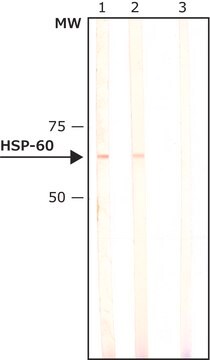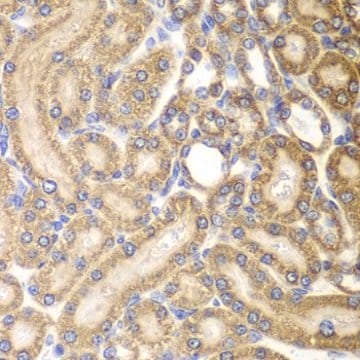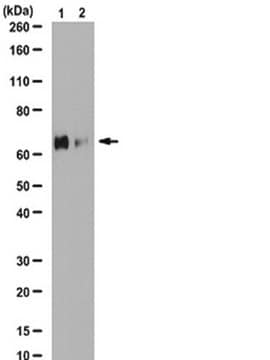H4149
Monoclonal Anti-Heat Shock Protein 60 antibody produced in mouse
clone LK1, ascites fluid
About This Item
Prodotti consigliati
Origine biologica
mouse
Coniugato
unconjugated
Forma dell’anticorpo
ascites fluid
Tipo di anticorpo
primary antibodies
Clone
LK1, monoclonal
PM
antigen 60 kDa
contiene
15 mM sodium azide
Reattività contro le specie
rat, human, chicken
tecniche
electron microscopy: suitable
immunohistochemistry (formalin-fixed, paraffin-embedded sections): suitable
indirect ELISA: suitable
western blot: 1:400 using cultured human foreskin fibroblast extract
Isotipo
IgG1
N° accesso UniProt
Condizioni di spedizione
dry ice
Temperatura di conservazione
−20°C
modifica post-traduzionali bersaglio
unmodified
Informazioni sul gene
human ... HSPD1(3329)
rat ... Hspd1(63868)
Descrizione generale
Specificità
Immunogeno
Applicazioni
- Enzyme linked immunosorbent assay (ELISA)
- Immunoblotting
- Immunocytochemistry
- Immunohistochemistry
- Immunoelectron microscopy
- Double immunofluorescence
Azioni biochim/fisiol
Stato fisico
Esclusione di responsabilità
Not finding the right product?
Try our Motore di ricerca dei prodotti.
Raccomandato
Codice della classe di stoccaggio
10 - Combustible liquids
Classe di pericolosità dell'acqua (WGK)
nwg
Punto d’infiammabilità (°F)
Not applicable
Punto d’infiammabilità (°C)
Not applicable
Certificati d'analisi (COA)
Cerca il Certificati d'analisi (COA) digitando il numero di lotto/batch corrispondente. I numeri di lotto o di batch sono stampati sull'etichetta dei prodotti dopo la parola ‘Lotto’ o ‘Batch’.
Possiedi già questo prodotto?
I documenti relativi ai prodotti acquistati recentemente sono disponibili nell’Archivio dei documenti.
Il team dei nostri ricercatori vanta grande esperienza in tutte le aree della ricerca quali Life Science, scienza dei materiali, sintesi chimica, cromatografia, discipline analitiche, ecc..
Contatta l'Assistenza Tecnica.








